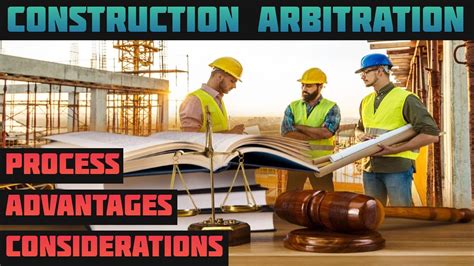Disputes are an unfortunate reality in the construction industry. With complex projects, multiple stakeholders, and tight deadlines, conflicts can arise quickly. However, not all disputes need to escalate into lengthy and costly court battles. Adjudication, a form of alternative dispute resolution, offers a faster and more cost-effective way to resolve construction disputes. In this article, we will explore the power of adjudication in construction and how it can streamline disputes.
The Importance of Dispute Resolution in Construction
Construction projects involve multiple parties, including contractors, subcontractors, architects, and clients. Each party has its own interests, and disagreements can arise over issues such as payment, delays, and defects. If left unresolved, these disputes can lead to significant costs, delays, and damage to relationships. In extreme cases, disputes can even lead to project abandonment.
Effective dispute resolution is crucial in the construction industry. It helps to prevent disputes from escalating, reduces costs, and minimizes delays. Moreover, dispute resolution can also help to maintain relationships between parties, which is essential for successful project completion.
What is Adjudication?
Adjudication is a form of alternative dispute resolution that involves a neutral third-party decision-maker, known as an adjudicator. The adjudicator reviews the dispute and makes a binding decision within a short period, usually 28 days. Adjudication is designed to be a fast and cost-effective way to resolve disputes, avoiding the need for lengthy and costly court battles.
How Does Adjudication Work?
The adjudication process typically involves the following steps:
- Notice of Adjudication: One party serves a notice of adjudication on the other party, specifying the dispute and the relief sought.
- Appointment of Adjudicator: The parties agree on an adjudicator or an adjudicator nominating body appoints one.
- Submission of Documents: The parties submit their documents and evidence to the adjudicator.
- Adjudicator's Decision: The adjudicator reviews the submissions and makes a binding decision within 28 days.
- Enforcement: The decision is enforced through the courts if necessary.
Benefits of Adjudication in Construction
Adjudication offers several benefits in construction disputes, including:
- Speed: Adjudication is a fast process, with decisions typically made within 28 days.
- Cost-effectiveness: Adjudication is less expensive than litigation, with lower costs for legal fees, court fees, and expert witnesses.
- Binding Decision: The adjudicator's decision is binding, providing certainty and finality.
- Expertise: Adjudicators are experts in construction law and practice, providing informed and authoritative decisions.
- Preservation of Relationships: Adjudication can help to preserve relationships between parties, essential for successful project completion.

Common Disputes in Construction that can be Resolved through Adjudication
Adjudication can be used to resolve a wide range of disputes in construction, including:
- Payment Disputes: Disputes over payment for work done, including claims for unpaid invoices and disputes over payment terms.
- Delay and Disruption Claims: Disputes over delays and disruptions to the project, including claims for loss and expense.
- Defects and Quality Issues: Disputes over defects and quality issues, including claims for remedial work and damages.
- Contractual Interpretation: Disputes over the interpretation of contractual terms, including disputes over contract administration and management.
Best Practices for Adjudication in Construction
To ensure successful adjudication in construction, parties should follow best practices, including:
- Clear Contractual Terms: Ensure that contractual terms are clear and concise, including dispute resolution clauses.
- Early Dispute Resolution: Encourage early dispute resolution, including negotiation and mediation.
- Adjudicator Selection: Select an adjudicator with expertise in construction law and practice.
- Submission of Documents: Submit all relevant documents and evidence to the adjudicator.
Gallery of Adjudication in Construction






FAQs
What is adjudication in construction?
+Adjudication is a form of alternative dispute resolution that involves a neutral third-party decision-maker, known as an adjudicator. The adjudicator reviews the dispute and makes a binding decision within a short period, usually 28 days.
What are the benefits of adjudication in construction?
+The benefits of adjudication in construction include speed, cost-effectiveness, binding decision, expertise, and preservation of relationships.
What types of disputes can be resolved through adjudication in construction?
+Adjudication can be used to resolve a wide range of disputes in construction, including payment disputes, delay and disruption claims, defects and quality issues, and contractual interpretation.
In conclusion, adjudication is a powerful tool for resolving disputes in construction. Its speed, cost-effectiveness, and binding decision make it an attractive alternative to litigation. By understanding the adjudication process, benefits, and best practices, parties can effectively resolve disputes and maintain successful project completion. We encourage you to share your thoughts and experiences with adjudication in construction in the comments below.
